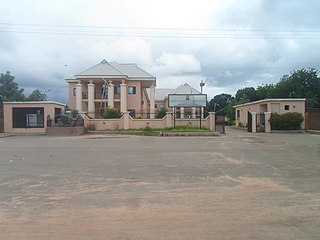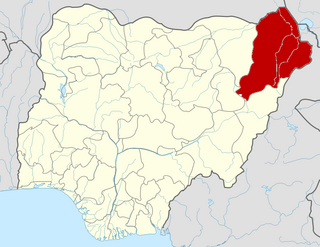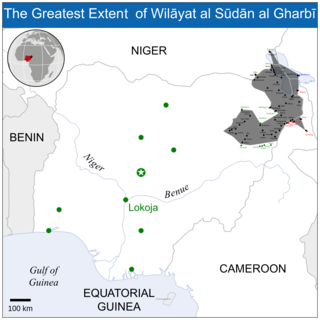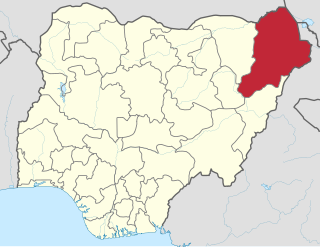
Maiduguri is the capital and the largest city of Borno State in north-eastern Nigeria, on the continent of Africa. The city sits along the seasonal Ngadda River which disappears into the Firki swamps in the areas around Lake Chad. Maiduguri was founded in 1907 as a military outpost by the British Empire during the colonial period. As of 2022, Maiduguri is estimated to have a population of approximately two million in the metropolitan area.

The University of Maiduguri (UNIMAID) is a Federal higher institution located in Maiduguri, the capital city of Borno State in Northeast Nigeria. The university was created by the federal government of Nigeria in 1975, with the intention of its becoming one of the country's principal higher-education institutions. It enrolls about 25,000 students in its combined programs, which include a college of medicine and faculties of agriculture, arts, environmental science, Allied health science, Basic medical science, dentistry, education, engineering, law, management science, pharmacy, science, social science, and veterinary medicine. With the encouragement of the federal government, the university has recently been increasing its research efforts, particularly in the fields of agriculture, medicine and conflict resolution, and expanding the university press. The university is the major higher institution of learning in the north-eastern part of the country.

Boko Haram, officially known as Jamā'at Ahl as-Sunnah lid-Da'wah wa'l-Jihād, is an Islamist jihadist organization based in northeastern Nigeria, which is also active in Chad, Niger, northern Cameroon, and Mali. In 2016, the group split, resulting in the emergence of a hostile faction known as the Islamic State's West Africa Province.

The Boko Haram insurgency began in July 2009, when the militant Islamist and jihadist rebel group Boko Haram started an armed rebellion against the government of Nigeria. The conflict is taking place within the context of long-standing issues of religious violence between Nigeria's Muslim and Christian communities, and the insurgents' ultimate aim is to establish an Islamic state in the region.
The 2011 Damaturu attacks were a series of coordinated assaults in the northern Nigerian city on 4 November 2011 that killed more than 100 people and injured hundreds more. A spokesperson for the Sunni Muslim terrorist group Boko Haram later claimed responsibility and promised "more attacks are on the way."
Timeline of the Boko Haram insurgency is the chronology of the Boko Haram insurgency, an ongoing armed conflict between Nigerian Islamist group Boko Haram and the Nigerian government. Boko Haram have carried out many attacks against the military, police and civilians since 2009, mostly in Nigeria. The low-intensity conflict is centred on Borno State. It peaked in the mid 2010s, when Boko Haram extended their insurgency into Cameroon, Chad and Niger.
The following lists events from 2014 in Nigeria.
The following lists events that happened in 2013 in Nigeria.

The 2014 Kano bombing was a terrorist attack on November 28, 2014, at the Central Mosque in Kano, the biggest city in the mainly Muslim Northern Nigeria during the Islamist insurgency in Nigeria. The mosque is next to the palace of the Emir of Kano, Muhammad Sanusi II, Nigeria's second most senior Muslim cleric, who had urged the civilians to protect themselves by arming up against Boko Haram. Two suicide bombers blew themselves up and gunmen opened fire on those who were trying to escape. Around 120 people were killed and another 260 injured.
The following lists events that happened during 2015 in Nigeria.

On March 7, 2015, a suicide bomber blew himself up on a cycle rickshaw near a fish market in Maiduguri in northeast Nigeria, and killed at least 10 people. Later, it was officially reported that there were a series of five bomb blasts carried out by suicide bombers on the same day in five different areas of the city. According to multiple sources, 58 people were killed and over 143 people wounded.

Starting in late January 2015, a coalition of West African troops launched an offensive against the Boko Haram insurgents in Nigeria.
On three days immediately before and during Ramadan, 2015, four attacks struck Chad's capital N'Djamena. Three suicide attacks against two police targets killed 33 people on 15 June, five policemen and six terrorists were killed during a police raid on 27 Jun, and a suicide bomber killed 15 in N'Djamena's main market, on 11 July.

On the evening of September 20, 2015, a series of bombings took place in Maiduguri and Monguno, Nigeria, killing at least 145 people and injuring at least 97 others. The majority of casualties occurred in Maiduguri where four explosions killed at least 117 people.
The 2015 Chad suicide bombings were a suicide attack which occurred the afternoon of Saturday 10, October 2015 in the town of Baga Sola, Chad, a small fishing community on Lake Chad. The attack was allegedly perpetrated by the Nigeria-based Islamic extremist group Boko Haram and resulted in the deaths of around 36 individuals, and wounded upwards of 50 more. The attacks were reportedly carried out by two women, two children, and a man with the intended targets being a busy marketplace, and a nearby refugee camp hosting tens of thousands of Nigerians. It was the deadliest attack to take place in the Lake Chad region.
This article contains a timeline of events from January 2015 to December 2015 related to the Islamic State of Iraq and the Levant (ISIL/ISIS). This article contains information about events committed by or on behalf of the Islamic State, as well as events performed by groups who oppose them.

On the evening of 16 June 2019, three suicide bombers detonated their explosives in Konduga village in Borno State, Nigeria, killing 30 people and wounding over 40. The first bomber targeted football fans who were watching a game on television in the hall. He was blocked from entering the hall by the owner. A heated argument ensued, during which the bomber detonated his explosives. This attack was the most deadly suicide bombing in 2019 in Nigeria. Soon after, the other two - both of whom were female - blew themselves up nearby.
On 21 November 2017, a suicide bombing occurred in Mubi, Adamawa State, Nigeria. A teenager detonated the explosives in a mosque as worshippers arrived for fajr prayer in the large town in eastern Nigeria, killing 50 people.
On Friday 16 February 2018, a triple suicide bombing occurred in Konduga, Borno State, northeastern Nigeria. Two suicide bombers detonated their explosives at a busy fish market at about 8:30pm. Four minutes later, a third bomber exploded nearby.








